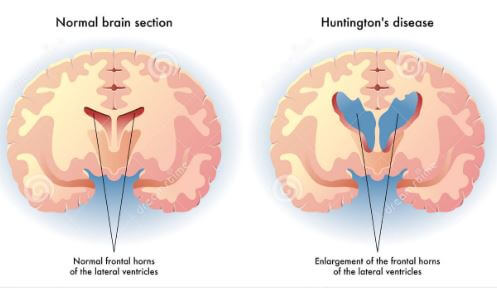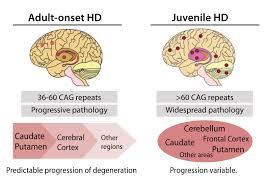What is Huntington disease?
Huntington is a hereditary disease that may affect a certain lineage of persons and their descendants. The condition is characterized by depletion of the brain cells with time. The nerve cells that are liable for the transmission of nerve impulses, hence their degradation lead to a deterred mind.
The disease has significant diverse effects on the way the body and mind coordinate to enhance optimal functioning. The problem may develop into an advanced stage where it affects the way of thinking and other psychological impairments.

The disease expresses its effects later on in life, maybe in the late thirties to the early forties. However, despite the late onset of the condition, its entry into the body may have been earlier on. In some cases, the disease may appear in the early twenties. This is called juvenile Huntington disease. This is followed by strange symptoms that are absent among later infections and rapid advancement of the disease.
Despite the availability of medication to cater for the problem, there still lies a big way to go as these cannot reverse the diverse effects that the disease could have brought be it psychologically or physically.
Symptoms
Upon contracting the disease, you are bound to suffer from movement, mental and psychiatric ailments. These conditions are expressed in a wide variety of signs and symptoms. The severity and nature of the infection differ from patient to patient. The symptoms experienced are also as diverse as there are patients. As the disease progress to advanced stages, some symptoms may appear to be more expressed than others and has significant negative impact on the organs that facilitate movement.
Movement disorders
Huntington disease can either bring about movement disorders voluntarily or involuntarily. The disorder affects the ability to move around but also deterred movement of body parts. Such could include:
- Muscle aches and stiffness
- Problematic speech and difficulty in swallowing.
- Loss of balance and improper posture
In the occasion that the condition affects your voluntary movements, the impact will be more adverse than involuntary. This means that the infection will render you unable to handle any duties, make speech and fend for yourself.
Cognitive disorders
There are some mental illnesses that come hand in hand with the Huntington disease. Such cognitive disorders include:
- Misplaced prioritizing
- Deterred coordination of ideas and thoughts
- Failure of self-realization
- Slow processing of information and finding the correct words to make speech
Psychiatric disorders
There are several psychiatric disorders that come with Huntington disease. However, despite the wide range of symptoms, the most evident t of them all is depression. The condition does not therefore set in as a result of mental pressure after contracting the disease but as a result of brain infection, injury and illness. Advancement of the ailment leads to altered brain function. Signs and symptoms include:
- Anger and distress
- Insomnia
- Tiredness and weariness
- Suicidal thoughts
Signs
The severity and development of the disease may vary in both teenagers and adults.

In earlier infections, the progression and development of the disease are higher than infections that occur later on in life. At the onset of the infection, you may experience some of these symptoms.
Social effects
- Behavioral alteration
- Poor performance in school studies
Bodily changes
- Stiff and inflexible muscles
- Seizures and convulsions
- Involuntary movements
Ensure you receive prompt and exhaustive diagnosis by a physician if you observe any of the above-stated symptoms. This will help avert a calamity that would have resulted as a result of advancement of the condition.
Causes
The condition is hereditary and may affect any of the descendants of the lineage in question. The ailment is a result of a flaw in one of the genes thus bringing about the illness. The disease being an autosomal dominant illness only needs one defected gene to fully incubate the disease.
The chances of a child within the lineage contracting the infection are 50-50. The parent can either pass on a healthy or weak gene to the child.
Treatment
Medication
Though medication is administered to combat the spread of Huntington disease and its effects, these cannot alter the already expressed effects of the disease. The psychological and psychiatric disorders cannot be undone only that their severity can be reduced.
The medication must be rolled out in such a manner that it does not lead to further complications rather than controlling the condition. A comprehensive treatment plan must be devised to control the spread of the disease. Following the right procedure of combating the effects of the ailment can improve the action of the medication in reducing the severity of the signs and symptoms. Continued therapy means that the patients can slowly adapt to living with the condition and devising communication strategies in case of speechlessness.
Parting shot
Such interventions and therapy will help correct and improve physical, social and psychiatric ailments that may be characterized. This is crucial as it greatly helps reduce depression which may come hand in hand with suicidal thoughts. Additional help from relatives, friends, and psychologists will go a long way in altering the symptoms of the disease and improve them for the better.
Complications
Soon after the disease has established itself in the body, it makes it more difficult for the affected to carry out their duties and responsibilities with ease. It deters the rate of doing work and this worsens as age progresses. The incubation period between contracting the disease and when you succumb to death is between 15 to 30 years. However, this may reduce as in the case of a Juvenile infection where the period can be reduced to slightly over ten years.
The suicidal thought experienced among most patients may increase as a result of depression. The depression is at its highest especially before a patient is diagnosed with the disease and in the later periods of establishment and spread of the condition.
Patients at an advanced stage of the disease cannot do anything on their own and require help from relatives and those close to them. This means that they cannot live independently on their own.
References
- Ferri FF. Ferri’s Clinical Advisor 2014: 5 Books in 1. Philadelphia, Pa.: Mosby Elsevier; 2014. https://www.clinicalkey.com. Accessed Jan. 27, 2014.
- Tabrizi SJ, et al. Predictors of phenotypic progression and disease onset in premanifest and early-stage Huntington’s disease in the TRACK-HD study: Analysis of 36-month observational data. The Lancet. 2013;12:637.
- Huntington’s disease: Hope through research. National Institute of Neurological Disorders and Stroke. http://www.ninds.nih.gov/disorders/huntington/huntington.htm. Accessed Jan. 27, 2014.
- Suchowersky O. Huntington disease: Clinical features and diagnosis.

My grandson, 25, has HD. He’s a Marine and will be discharged due to his HD.
I need to find him a placement that will assist him with HD
Any help you can give me will be deeply appreciated.
Thank you